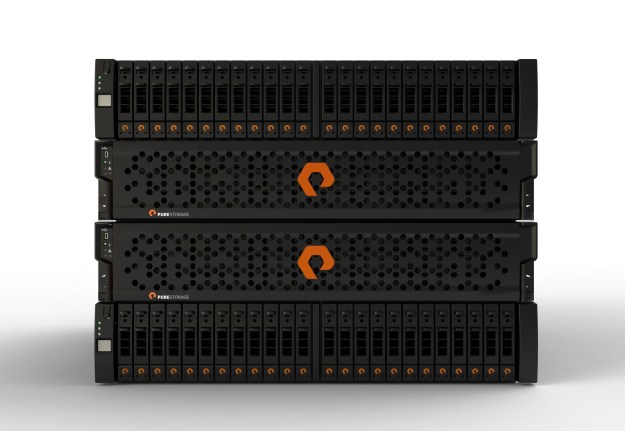
It’s doubtless that one day flash storage, like SSDs, will replace hard disks for data centers and enterprise storage. SSDs are generally faster, more reliable and use less power than hard disks. As usual in the tech world, the question is who’s going to make the first leap, and when’s it going to happen?
There have already been a bunch of start-ups looking to cash in with all-flash storage solutions, but one in particular made a big splash this week: Pure Storage announced it raised $30 million in fresh capital while unveiling an flash-storage array that’s nearly ready for market.
The Pure Storage FlashArray FA-300 Series is the stuff IT guys dreamed of only recently. It’s a purpose-built flash array, unlike the flash-disk hybrids that are more commonly available now, that the company claims is ten times faster and ten times more space efficient than current hard disk offerings.
Using custom software to control data flow and write/rewrite processes, Pure Storage says its array can achieve a twenty-time reduction in inline data; in other words, the firm claims that using its flash storage for servers and the like can reduce workflow data transfers by up to 95%. The array comes in sizes from 10 to 100 terabytes at an estimate cost of $5 per usable gigabyte.
As impressive as Pure Storage’s offering is, it’s hardly the only player in the game, and lags behind others in terms of bringing a product to market. As far as other start-ups are concerned, Violin Memory has leaped out to become the current favorite. The company’s already gathered $310 million in financing, and with products already on the market, expects to eclipse $100 million in sales this year.
On the slightly smaller end, Nimbus Data Systems doesn’t have the kind of numbers Violin Memory has, but it has proven profitable. Even better for the company, it’s already scored a couple hundred contracts including one with eBay.
Editors' Recommendations
- How to back up your computer
- Forget ray tracing. The biggest upgrade to the Xbox Series X will be storage


